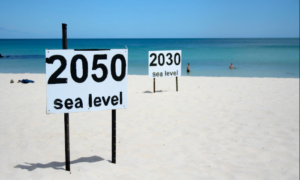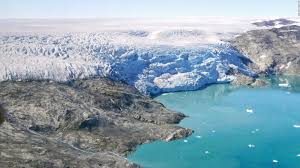The reason they make sounds at all is basically because glaciers contain bubbles, which make sounds. We mentioned that a glacier is a big body of ice, and the number of bubbles in one is just enormous—there are billions of bubbles inside.
In contrast, when you have an iceberg, that’s a much smaller piece of ice, so you have only thousands of bubbles or so. That’s a big difference, which means that for a melting glacier, you just hear a constant cacophony of sound. Just listen. There are so many bubbles released to the water at the same time that you just cannot distinguish between individual pulsations. Oskar Glowacki, the Scripps Institution of Oceanography
 Climatologists project that by 2050 up to one quarter of the presently existing mountain glacier ice will disappear, accounting for 1/3 of projected sea level rise.
Climatologists project that by 2050 up to one quarter of the presently existing mountain glacier ice will disappear, accounting for 1/3 of projected sea level rise.
Compliance with targets outlined in the Paris Agreement to keep global temperature well below 2 degrees by mid century could mitigate the threat of 1.3 meter sea level rise, largely attributable to melting ice from Arctic glaciers, most specifically those in Greenland.
 “There’s a lot of ambiguity in post-2050 projections of sea-level rise and we may have to live with that for a while,” Robert E. Kopp, lead author and Earth and planetary sciences professor at Rutgers University, said in a statement. “We could end up with 8 feet of sea level rise in 2100, but we’re not likely to have clear evidence for that by 2050.”
“There’s a lot of ambiguity in post-2050 projections of sea-level rise and we may have to live with that for a while,” Robert E. Kopp, lead author and Earth and planetary sciences professor at Rutgers University, said in a statement. “We could end up with 8 feet of sea level rise in 2100, but we’re not likely to have clear evidence for that by 2050.”
As atmospheric and oceanic temperatures increase, the water from glacial melt expands, appropriating more space and thereby significantly contributing to sea level rise. The uptick in increased glacial “wasting” will have other dramatic environmental impacts; altering oceanic ecosystems and changing circulation patterns of vitally influential ocean currents. These changes will have drastic impacts on future generations.
 According to NASA, Greenland is ground zero in scientific studies of climate change: its melting glaciers and ice shelves contribute two times more to sea level rise than Antarctica. The Arctic region itself is warming twice as fast as the rest of the planet.
According to NASA, Greenland is ground zero in scientific studies of climate change: its melting glaciers and ice shelves contribute two times more to sea level rise than Antarctica. The Arctic region itself is warming twice as fast as the rest of the planet.
“When you come here for like ten years, twenty years, you start to recognize some of these landscapes really changing, says Jason Box, professor in Glaciology at the Geological Survey of Denmark and Greenland.
 The landscape in Greenland, Box says, has changed more than he thought possible. “We keep being surprised at how sensitive this system is to the ongoing warming in the atmosphere and in the ocean.
The landscape in Greenland, Box says, has changed more than he thought possible. “We keep being surprised at how sensitive this system is to the ongoing warming in the atmosphere and in the ocean.
More warming in Greenland is inevitable, he says. “There’s nothing we can do but wait because just halting emissions is not going to get us there.
“We cling to a hope because we don’t want to be complicit in the destruction of our environment and the environment that our children will inherit.”
